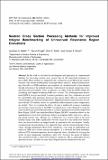Neutron Cross Section Processing Methods for Improved Integral Benchmarking of Unresolved Resonance Region Evaluations
Author(s)
Brown, Forrest B.; Walsh, Jonathan Alan; Forget, Benoit Robert Yves; Smith, Kord S.
Downloadepjconf_wonder2016_06001.pdf (122.5Kb)
PUBLISHER_CC
Publisher with Creative Commons License
Creative Commons Attribution
Terms of use
Metadata
Show full item recordAbstract
In this work we describe the development and application of computational methods for processing neutron cross section data in the unresolved resonance region (URR). These methods are integrated with a continuous-energy Monte Carlo neutron transport code, thereby enabling their use in high-fidelity analyses. Enhanced understanding of the effects of URR evaluation representations on calculated results is then obtained through utilization of the methods in Monte Carlo integral benchmark simulations of fast spectrum critical assemblies. First, we present a so-called on-the-fly (OTF) method for calculating and Doppler broadening URR cross sections. This method proceeds directly from ENDF-6 average unresolved resonance parameters and, thus, eliminates any need for a probability table generation pre-processing step in which tables are constructed at several energies for all desired temperatures. Significant memory reduction may be realized with the OTF method relative to a probability table treatment if many temperatures are needed. Next, we examine the effects of using a multi-level resonance formalism for resonance reconstruction in the URR. A comparison of results obtained by using the same stochastically-generated realization of resonance parameters in both the single-level Breit-Wigner (SLBW) and multi-level Breit-Wigner (MLBW) formalisms allows for the quantification of level-level interference effects on integrated tallies such as k eff and energy group reaction rates. Though, as is well-known, cross section values at any given incident energy may differ significantly between single-level and multi-level formulations, the observed effects on integral results are minimal in this investigation. Finally, we demonstrate the calculation of true expected values, and the statistical spread of those values, through independent Monte Carlo simulations, each using an independent realization of URR cross section structure throughout. It is observed that both probability table and OTF treatments reproduce the true expected values, calculated by averaging the results of many independent simulations, quite well. However, the spread of independent calculation results is shown to be relatively significant. The k eff eigenvalues for fast spectrum systems can differ by more than 250 pcm from one simulation to the next.
Date issued
2016-03Department
Massachusetts Institute of Technology. Department of Nuclear Science and EngineeringJournal
EPJ Web of Conferences
Publisher
EDP Sciences
Citation
Walsh, Jonathan A. et al. “Neutron Cross Section Processing Methods for Improved Integral Benchmarking of Unresolved Resonance Region Evaluations.” Edited by O. Serot. EPJ Web of Conferences 111 (2016): 06001.© 2016 Owned by the authors, published by EDP Sciences
Version: Final published version
ISSN
2100-014X